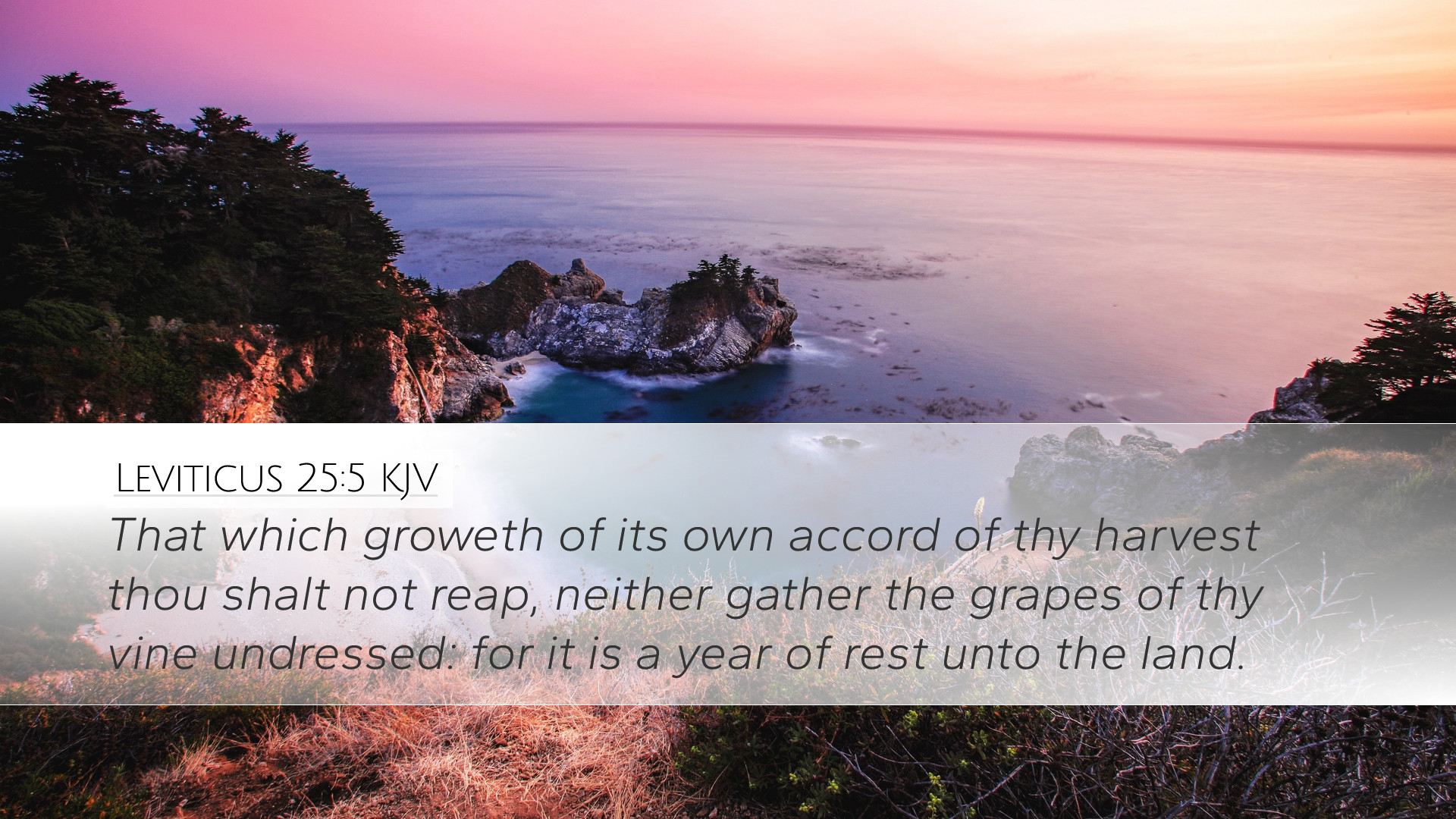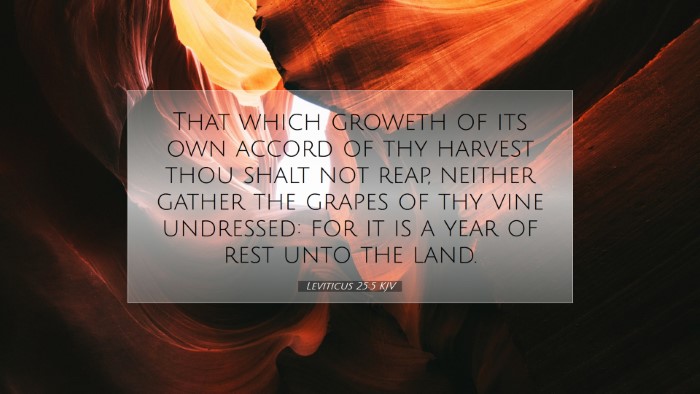Commentary on Leviticus 25:5
Bible Verse: Leviticus 25:5 - "That which grows of its own accord of thy harvest thou shalt not reap, neither gather the grapes of thy vine undressed: for it is a year of rest unto the land."
Introduction
The verse Leviticus 25:5 is part of the extensive laws governing the Sabbatical year, a significant aspect of Israelite life and covenantal theology. This period emphasized rest, grace, and divine provision, as well as the stewardship of God's creation. Here we will explore the implications of this regulation through insights from several prominent public domain commentaries.
Understanding the Context
In Leviticus 25, God outlines a framework for the Israelites, emphasizing rest not only for the people but also for the land. The Sabbath rest for the land—referred to as the sabbatical year—occurred every seventh year. This verse specifically focuses on agricultural practices and the prohibition against harvesting natural growth during this year.
Matthew Henry's Insights
Matthew Henry observes that this commandment serves to underline God's ownership of the land. The Hebrew people were stewards rather than owners of the land, and this law enforced the concept of dependence on God for provision. Henry emphasizes three primary lessons from this verse:
- God's Sovereignty: The land belongs to God, and its productivity is at His discretion.
- Sabbath Principle: Just as mankind is to rest on the Sabbath, the land too must experience rest, promoting ecological health and sustainability.
- Provision in Dependence: Trusting in God's provision was crucial, as farmers were instructed to refrain from reaping what grew of itself, highlighting reliance on divine rather than human effort.
Albert Barnes' Commentary
Albert Barnes provides further depth by contextualizing the agricultural practices of the ancient Near East. He notes that the Israelites lived in an agrarian society where their livelihoods depended on the land. Barnes points out:
- This law might seem economically impractical; however, it cultivated social equity by allowing the poor and the sojourner to glean from what grew naturally.
- It generated a rhythm of labor and rest, reinforcing community bonds, as during the sabbatical year, all members of the community were to share in the bounty of the land equally.
Barnes also underscores the spiritual significance of this practice—that it reminds the Israelites of their historical deliverance from slavery in Egypt, where they had no rest or personal property.
Adam Clarke's Exegesis
Adam Clarke provides an exhaustive analysis, making theological connections between this text and historical practices of ancient peoples. He discusses:
- Restoration: The requirement of allowing the land to rest was not merely for ecological reasons but deeply tied to God's restorative nature.
- Community Welfare: Although individual harvests were prohibited, God's law ensured communal engagement with the bounty that the land would still provide, allowing for shared sustenance among neighbors.
- Foreshadowing of Christ: Clarke draws a parallel between the Sabbath principle and the coming of Christ, who would be the ultimate rest for humanity, offering spiritual reprieve from the toil of sin.
Theological Implications
This verse and its surrounding context present profound theological insights:
- Divine Ownership: The foundational principle of stewardship emerges, prompting believers to understand their responsibility towards God's creation.
- Holistic Rest: The concept of rest encompasses not only physical reprieve for the land but also an invitation for spiritual renewal and trust in God's providence.
- Social Justice: The provision for the poor during the sabbatical year underscores an ethical responsibility to care for the marginalized, echoing the heart of God's law throughout Scripture.
Application for Believers
Reflecting on Leviticus 25:5, contemporary believers can draw practical lessons:
- Adopting rhythms of work and rest in our own lives that honor God’s design
- Engaging in acts of mercy and kindness, especially towards the marginalized, as was exemplified by God's law
- Understanding that ultimately, all provision comes from God, leading to a life of gratitude and dependence on Him
Conclusion
Leviticus 25:5, while rooted in ancient agrarian law, challenges modern believers to reflect on stewardship, community, and reliance on divine provision. The insights from Matthew Henry, Albert Barnes, and Adam Clarke elucidate the far-reaching spiritual and practical applications of this verse, calling us to live in harmony with God’s creation and with one another.


